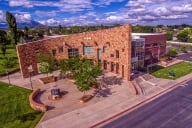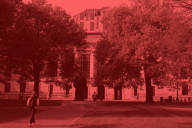You have /5 articles left.
Sign up for a free account or log in.
An analysis of testing strategies at more than 1,400 institutions found that more than two-thirds either have no clear testing plan or are only testing “at-risk” students, those who either feel sick or who have had contact with an individual who tested positive for coronavirus, National Public Radio reported. The analysis was done by researchers at the College Crisis Initiative at Davidson College in North Carolina.
Just 25 percent of colleges are conducting mass screening or random “surveillance” testing of students, according to the analysis. Only 6 percent are routinely testing all of their students.
Some experts have argued that frequent surveillance testing is necessary to contain outbreaks because the virus can be spread by asymptomatic and presymptomatic individuals. Recently revised guidance on testing at higher education institutions from the Centers for Disease Control and Prevention says that “a strategy of entry screening combined with regular serial testing might prevent or reduce” transmission of the virus, although the guidance stops short of explicitly recommending serial testing as a strategy.
Officials at many institutions that are not testing regularly say that doing so would be too expensive for them.
-- Elizabeth Redden
The president of Florida State University, John Thrasher, and his wife, Jean, have both tested positive for COVID-19, the university announced Tuesday.
The university said that Thrasher tested negative for the virus as recently as Friday and, as a result, attended the football team's game on Saturday and "took appropriate precautions."
Florida State officials are conducting tracing of those who have been in close contact with the Thrashers, and the statement said that some members of the president's staff had been tested and received negative results.
-- Doug Lederman
Another flurry of colleges and universities curtailed activity on their campuses early this week, seeking to slow the spread of the coronavirus among students or keep it from seeping into the local community.
Scott Community College, part of Eastern Iowa Community Colleges, said Monday that it would close its main campus until Oct. 12 after a small number of staff reported positive cases of COVID-19.
As of Monday morning, two staff members had reported testing positive for the virus, according to a college spokesman.
"In an abundance of caution," the campus was closed to everyone to prevent spreading the virus, the website states. Students will take their courses online this week, and services will be provided virtually. No one is allowed onto campus. Faculty can make appointments to pick up items they need to work from home.
The college's other campuses remain open.
Kellogg Community College, in Michigan, said Monday that it would move almost all of its remaining in-person courses online for the rest of the fall semester, citing a desire to "reduce the number of people who are interacting with others on a KCC campus at any given time."
Kellogg officials said the number of cases on the campus remains small, but that the positivity rates in the three counties surrounding the college had risen to between 3.2 percent and 6.1 percent.
Also Monday, the State University of New York College at Cortland and Johnson & Wales University's original campus in Providence, R.I., said they would shift to virtual instruction for two weeks.
SUNY Cortland said the college had surpassed the 100-case COVID-19 threshold that Governor Andrew M. Cuomo set last month for such a pivot. SUNY chancellor Jim Malatras, who has taken on a highly visible, hands-on role in combating COVID-19 since taking on the system's top job last month, also appointed SUNY's police chief to work with Cortland's police on "safety protocol enforcement."
Administrators at Johnson & Wales said a spike in students living off campus was responsible for the Providence campus's pause in in-person instruction. "The measures we are taking this week will help protect our campus community as well as those who live in the neighborhoods where our students reside," said Marie Bernardo-Sousa, the Providence campus president.
-- Madeline St. Amour and Doug Lederman








